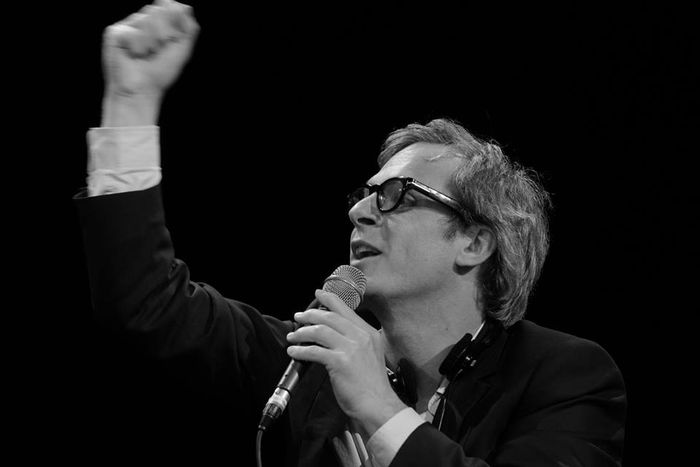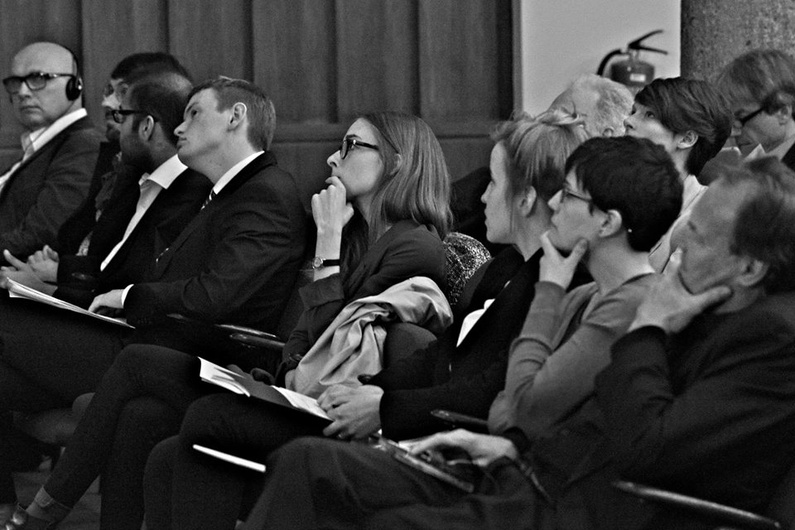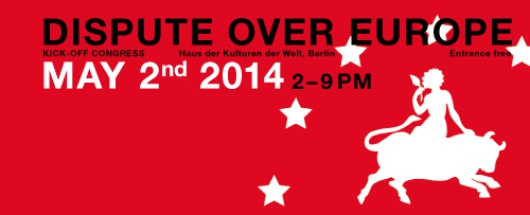
Camille de Toledo: "Enough with the past!"
Published on
Translation by:
 Danny S.
Danny S.
"The past is too present in the organization of Europe. What about a little bit more future instead?" The French writer and philosopher Camille de Toledo also throws in his two cents at "A Dispute over Europe" on May 2, 2014 in Berlin. He pleads as founder of "Société européenne des auteurs" for a multilingual European citizens community. Interview
The French philosopher Camille de Toledo is a prime European; while his Jewish roots lay in Turkey and while his family has lived in both Spain and Switzerland over the past couple centuries, he himself was born in Lyon, but now lives in Berlin. His concept of "metalinguistics" as starting point for a new European mentality stems out of his own experience of crossing borders between countries, languages and cultures. Because of this Camille de Toledo can say from the bottom of his heart that, "I live in between languages. Je vis entre les langues. Ich lebe zwischen den Sprachen." Cafébabel met with the philosopher in Berlin at A Dispute over Europe.
Cafébabel: Election day is drawing closer, but Europe's youth doesn't seem to be interested. Why do you believe that one should be interested in Europe?
Camille de Toledo: Because otherwise will be interested in you. (he laughs) It's important to acknowledge that Europe -- in the way it's presented at the moment -- isn't enticing for the younger generation. It moves them, however, in a different way; the youth is connected through networks and friendships that cross borders because their culture alone is all-encompassing of different countries. In this respect, the younger generation is a lot more European than their predecessors. But one has to absolutely differentiate between Euroland -- or, the politics in Brussels and their agenda -- and the politics of the younger generation. If one doesn't separate these two from each other, then one will continue to claim that the youth is dissinterested in politics.
Portrait of auther and philosopher Camille de Toledo on Artnet.fr (2012).
Cafébabel: To what extent is the European youth political?
Camille de Toledo: Movements such as Movimiento 15-M in Spain or Occupy in Madrid reveal that the youth is very involved with politics, but in the context of current institutions, they don't yet have a voice. The older generatons refuse to lend an ear to his form of "subterranean politics", as it was recently described in a study by the London School of Economics. Some movements are unbelievably political, such as in areas like the environment, data protection, democratic transparency, transidentity, and minority rights, etc. But still these questions aren't enough room to be able to say to the younger generation, "hey look, the structures are changing because your political stances were listened to."
Cafébabel: Can the current European generation play a deciding role in European politics?
Camille de Toledo: I'm convinced that if tomorrow or in ten years a European citizens movement were to take place, an unbelievable amount of young people would take to the streets. For one, current living conditions, high unemployment rates and similar problems were triggered by political decisions in Brussels as well as in individual countries. To start, there has to be a protest movement. But at the moment we're just not capable of fomenting a protest movement with a European standpoint.
 Cafébabel: Why is translation the key to Europe's future?
Cafébabel: Why is translation the key to Europe's future?
Camille de Toledo: In my opinion, translations is one of the keys to European citizenship. When attempting to create a European nation one is confronted with the question of a mutual language. But in what language can one be vexed over a "political common ground," which itself is multilingual and fragmented. One has to think of European citizenship in the context of a translation between the original and the up-and-coming culture, between original and dawning languages, but also between genders, between feminine and masculine. These topics move the youth of today.
Cafébabel: What is the goal of the Société européenne des auteurs, of which you are the founder?
Camille de Toledo: The Société européenne des auteurs (European community of authors, Ed.) was founded in 2008 as a literary and intellectual community that's entirely predicated on translation. Up until now, old institutions and elites in Brussels haven't asked themselves which language deserves a primary focus of which sentiments bind us emotionally to the political realm. If we can't succeed in convincing people in Europe, it's because a memory effect dominates the scene. We hear demands such as "remember WWII! Remember what happened back then!" That story affected the generation of Mitterrand, Kohl and even Delors. But today, this memory effect can no longer affect the younger generation. After all, they live in a culture of hybridization, of translation and of border-transcending nations. The past is too present in the foundations of Europe. What about a little more future instead?
CAFÉBABEL BERLIN disputes about europe
 Cafébabel Berlin is an official media partner of A Dispute over Europe. Following May 2, 2014, you will be able to read articles centered on the congress as well as interviews with the panel members. More updates can be found on Facebook and Twitter.
Cafébabel Berlin is an official media partner of A Dispute over Europe. Following May 2, 2014, you will be able to read articles centered on the congress as well as interviews with the panel members. More updates can be found on Facebook and Twitter.
Translated from Camille de Toledo: "Schluss mit Vergangenheit!"


